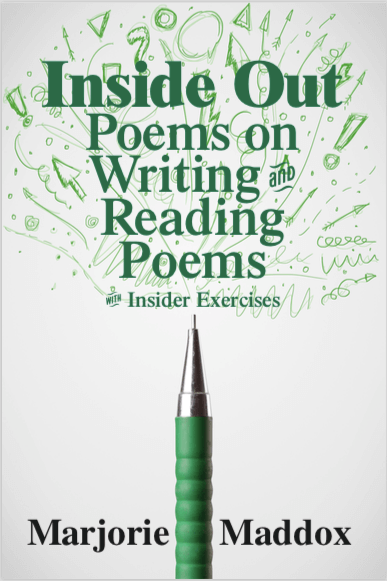Inside Out Poems on Writing and Reading Poems

Begin
leap from the step
not knowing how
you’ll land
let your mind spin like a pinwheel
chase the flying shards of light
get distracted
by an ant
the scent of sliced cucumber
someone else’s words
stuff them up your sleeve
dump them on the table
make a mess in one room
move onto the next
come back later
to see what’s there
Elizabeth Steinglass
Last week I had the pleasure of reading Inside Out: Poems on Writing and Reading Poems with Insider Exercises by Marjorie Maddox. Marjorie is a professor of English and Creative Writing at Lock Haven University, winner of the 2019 Foley Poetry Prize, and the author of 11 collections of poetry, including Rules of the Game: Baseball Poems and A Crossing of Zebras: Animal Packs in Poetry. I met Marjorie many years ago at a workshop at the Highlights Foundation where she led us through a wonderful exercise on metaphor.
Intended for YA readers (like much of YA also can be enjoyed by adults!), the collection includes 27 poems that take on poetry through poetry. The first six poems are about connecting with poetry as a reader, using all our senses and getting to know a poem like you might a friend. Befriending a Poem describes a much more appealing approach than the tortured analysis Billy Collins describes in his poem (one of my favorites) Introduction to Poetry.
Befriending a Poem
Invite him home for dinner
but don’t insist on rhyme;
he may be as tired and as overworked
as his distant cousin Cliché.
Best to offer intriguing conversation
that’s light on analysis.
Allow for silences and spontaneity.
Most importantly, like any good friend,
be faithful and patient;
remember to listen.
Sometimes he’s shy
and just needs a little time and coaxing.
Much of what he has to say
lies between the lines.
I absolutely love the end of this poem—remember to listen, time and coaxing, between the lines. Just perfect.
The second set of poems addresses poetry tools, such as concrete and abstract language, metaphor and simile, personification, alliteration, line length, etc.
The couplet poem made me laugh out loud:
Couplet
Poetic twins all dressed in rhyme
stroll side-by-side in two straight lines.
The final set of poems are about various forms, for example the sonnet, the sestina and the villanelle, written of course in those forms.
I love the mash up of new and old and the clever reworking of the repeated lines in the poem “How to Text a Triolet.”
How to Text a Triolet
If you all want to text a triolet,
it really is no secret what to do.
First concentrate on what you have to say
and if you want to write. A triolet
says what you said before; it’s déjà vu,
though you can always change a word or two
if you all want. To text a triolet,
it really is no secret what to do.
The book ends with nine accessible and collaborative exercises that build on poems from the collection.
My poem, above, was written in response to Exercise 3: Tug of War between Concrete and Abstract. Though the exercise is intended for a group (and would be very fun that way!) I did it by myself. I wrote abstract words on little pieces of paper, grabbed one from my hat, and then did some freewriting about what the word made me see, smell, hear, touch, and taste. I then wrote a poem about the abstract concept without using the word for it. Marjorie suggests asking your writing friends if they can guess what your word was. Can you? Let me know your guesses in the comments.
The next one I want to try is Exercise 7: The Short and Long of It
In this one you find a poem you like, copy it twice as a block of words without breaks. Then you and a friend take the words and independently add breaks where you like. When you’re done, you compare and discuss your choices. At the end Marjorie suggests taking a poem you’ve written and rewriting it with different breaks.
What do you think?
Begin
Leap from the
step
not knowing how
you’ll land
let your mind spin
like a pin-
wheel
chase the flying
shards of
light get
distracted by an ant the scent
of sliced cucumber someone else’s
words
stuff them
up your sleeve
dump them
on the table make a mess
in one room move
onto the next
come back
later to see
what’s there
Well that was helpful! I think I’ll go back up to the top and make a little change…
To learn more about Inside Out, check out the reviews at Jama’s Alphabet Soup, Matt’s Radio, Rhythm & Rhyme, and Sylvia Vardell’s Poetry for Children. Better yet, order a copy or request one from your library, so you can read the whole thing.
Happy Poetry Friday. Franki and Mary Lee have the roundup at A Year of Reading.
I hope all is well with you and yours.
Liz


I keep seeing this book EVERYWHERE, so it must be a sign that it’s time to own it and try some of the challenges for myself!
Your poem “Begin” describes my gloriously unstructured and distractible summer time!
I’m not going to tell yet, but your answer makes perfect sense!
Maddox’s book looks so good. I love that an exercise brought out your first poem and then a subsequent exercise had you change the breaks and the tone and tenor of poem changed. So cool. I’ve been thinking about the abstract concept you might be describing, but I’m not sure what is so I’ll go with the guess: confusion? Or that’s just me 😉
Haha! That’s very funny in light of what I had in mind. I’ll come back later and confess.
I have this book now, but need to just sit down and get going on it. It’s such an interesting exercise to take a poem and just break it up differently. It really makes you think, doesn’t it, why you ended a line on a certain word and not another. Great post.
Yes, I think it’s a really valuable exercise.
Oh Liz,
I have this book and love it. I got two extras for graduation gifts for “just the right kids” from my last class who are now seniors. Begin….is it about writing? I can relate to looking at an ant and being distracted by the scent of a cucumber…and someone else’s words ie in a book or here online at blogs etc. I like it and enjoy hearing more about Marjorie’s book and I have it out as a new book to work from. Did she come to David Harrison’s workshop to work with you? I am curious. I plan to spend a lot of time writing this summer. So gathering my ideas for that time. (Unless things change our trip to Maine which is not quite 2 weeks and the rule says,” two week quarantine upon arrival” seems like it will not happen, I am going to stay-cation and write more.)
Yes, I think it was the workshop with David Harrison, Rebecca Kai Dotlich, and Eileen Spinelli. It was a big group that year. I hope you get a chance to write more this summer.
I like the idea of dumping them on the table and making a mess. Feel free to play and make mistakes!
I also keep seeing this book everywhere. It looks great! I like, ‘Begin.’ My whole house looks like an illustration to this poem. Where is the poem for focus? I will be getting this book. It looks like something I need for me and my students.
ooooh…good idea. Maybe I’ll try a poem for focus next.
Thanks to you all for visiting and commenting. The abstract word I pulled from my hat was creativity, which I think works in a way for all your answers–summer is a time for creativity, confusion is a part of creativity, writing is definitely an act of creativity, playing and making mistakes are part of creativity, and Linda, I’m guessing there’s been lots of creativity at your house!
Knowing “the answer,” I think I enjoyed reading the guesses as much as you did, Liz! This is truly a useful and wonderful review—to not only showcase poems in this anthology, but to illustrate how the book’s exercises were used in your own poems. I love several moments in “Being”—like these lines: “let your mind spin like a pinwheel/chase the flying shards of light” (gorgeous!) and these lines: “get distracted/by an ant” (love how the line break itself shows that you were distracted), and probably these most of all: “make a mess in one room/move onto the next/come back later/to see what’s there” just because they’re so dang relatable!
Collection, not anthology. You knew what I meant. 🙂
Liz, this was such a meaty post with lots of poetry goodness to digest and try out on my own. So I get distracted lately. One thing leads to another and then, many times forget where I started. Your first and last poems remind me of my process on many days. Love these.
Hi Liz, I love Marjorie’s new book & then this time, what you did yourself with it. Changing the lines made the poem so very different, at least it did to me. I liked reading all the ‘guesses’, too & I didn’t guess correctly. My thought was “present”! Being messy is a perfect way to be when writing! Thanks for this lovely review of this book. Hoping everyone has it for their students along with themselves!
Hi Liz… thanks so much for this post. I think I have this book on my wish list, but I think I’ll just go ahead and order it now. Your poems were so helpful! No, I didn’t guess creativity, but my mind was digging around for a good answer when I came upon it. Oh well. I loved the re-ordering of your poem. I struggle with line breaks… tricky business in my opinion. Your changes gave me a whole new insight. Thanks again…
Liz – thanks for creating two versions of the same mighty fine poem. Not ssure why but my eyes & ears track your 2nd version of “Begin” with more glee than the 1st. Appreciations for bringing up Marjorie Maddox, whose work I have enjoyed but having read in too long. A new book for the list. And I’m thinking this post will ensure it rolls into many school & library tool kits.